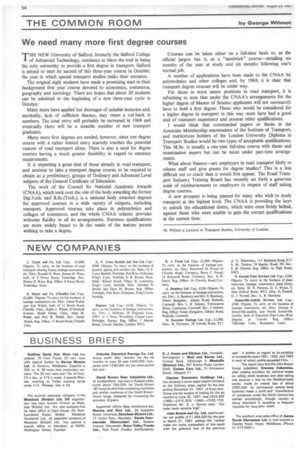We need many more first degree courses
Page 56

If you've noticed an error in this article please click here to report it so we can fix it.
THE NEW University of Salford, formerly the Salford College of Advanced Technology, continues to blaze the trail in being the only university to provide a first degree in transport. Salford is poised to start its second of this three-year course in October, the year in which special transport studies make their entrance.
The original eight students have made a promising start in their background first year course devoted to economics, commerce, geography and sociology. There are hopes that about 20 students can be admitted to the beginning of a new three-year cycle in October.
Many more have applied but shortages of suitable lecturers and, inevitably, lack of sufficient finance, may mean a cut-back in numbers. The total entry will probably be increased in 1968 and eventually there will be a sizeable number of new transport graduates.
Many more first degrees are needed, however, since one degree course with a rather limited entry scarcely touches the potential custom of road transport alone. There is also a need for degree courses having a much greater flexibility in regard to entrance requirements.
It is expecting a great deal of those already in road transport, and anxious to take a transport degree course, to be required to obtain as a preliminary, groups of Ordinary and Advanced Level subjects of the General Certificate of Education.
The work of the Council for National Academic Awards (CNAA), which took over the role of the body awarding the former Dip.Tech. and B.Sc.(Tech.), is a national body awarded degrees for approved courses in a wide variety of subjects, including transport. Approved courses take place in polytechnics and colleges of commerce, and the whole CNAA scheme provides welcome fluidity in all its arrangements. Entrance qualifications are more widely based to fit the needs of the mature person wishing to take a degree. Courses can be taken either on a full-time basis or, as the official jargon has it, as a "sandwich" course—entailing sixmonths of the year at study and six months following one's normal job.
A number of applications have been made to the CNAA by polytechnics and other colleges and, by 1968, it is clear that transport degree courses will be under way.
For those in more senior positions in road transport, it is refreshing to note that under the CNAA's arrangements for the higher degree of Master of Science applicants will not necessarily have to hold a first degree. Those who would be considered for a higher degree in transport in this way must have had a good deal of transport experience and possess other qualifications.
I would think that commended papers or thesis in the Associate Membership examination of the Institute of Transport, and meritorious holders of the London University Diploma in Transport Studies would be two types of acceptable qualifications. This M.Sc. is usually a one-year full-time course with thesis and examination papers but can be taken under part-time arrangements.
What about finance—are employers in road transport likely to release staff and give grants for degree studies? This is a less difficult nut to crack than it would first appear. The Road Transport Industry Training Board has recently set forth a generous scale of reimbursements to employers in respect of staff taking degree courses.
A new prospect is being opened for many who wish to study transport at the highest level. The CNAA is providing the keys to unlock the educational doors, which were once firmly bolted, against those who were unable to gain the correct qualifications at the correct time.
M. Wilmot is Lecturer in Transport Studies, University of London.












































































































